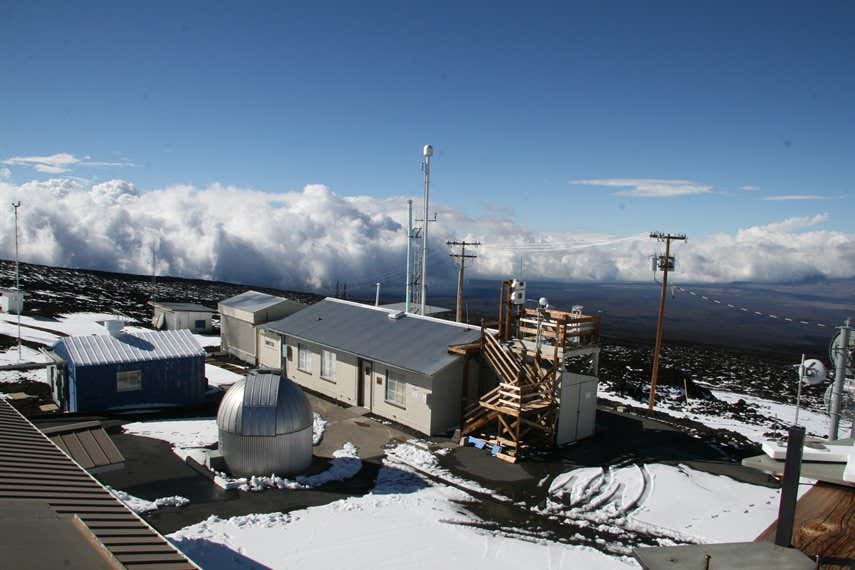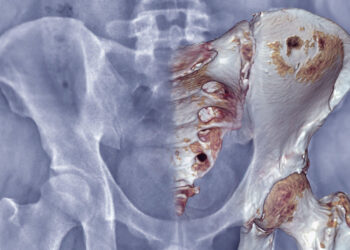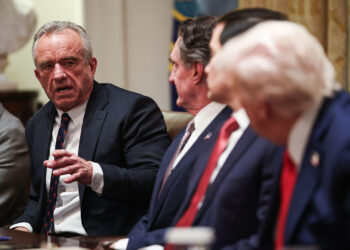
Carbon dioxide measurements at Mauna Loa Observatory in Hawaii could be halted by US spending cuts
NOAA
Scientific agencies in other countries must prepare to take over as much of the key carbon dioxide monitoring services currently carried out by the US as possible, climate scientists are warning.
This monitoring could end next year under planned budget cuts, resulting in the loss of crucial data. “At the moment I’m not aware of anyone saying, ‘Okay, we can do it. We will take over’,” says Pierre Friedlingstein at the University of Exeter in the UK. “It has to be done.”
Friedlingstein leads the Global Carbon Budget, an international effort to quantify exactly how much CO₂ is being emitted and how much is being taken up by the land and oceans – crucial factors for understanding Earth’s rising temperatures.
This work relies heavily on the US National Oceanic and Atmospheric Administration (NOAA), which is being targeted for budget cuts by the Trump administration. A budget document for fiscal year 2026 proposes to eliminate the agency’s spending on climate and weather research and cut its full-time staff by more than 2000 people. It also proposes to shut down laboratories including Mauna Loa Observatory in Hawaii, a key site for CO₂ monitoring.
“The NOAA GML [Global Monitoring Laboratory] greenhouse gas programme is the backbone of global carbon observing, which serves many roles,” says Ralph Keeling at the Scripps Institution of Oceanography in California.
NOAA directly measures the level of gases such as CO₂ at many sites and supports such monitoring elsewhere around the world, including by calibrating measurements based on samples sent to it, says Friedlingstein.
The agency also assembles and analyses all the global data. This includes using the small differences in CO₂ levels between sites, along with knowledge of atmospheric circulation, to work out CO₂ flows.
“NOAA is providing critical baseline data,” says Keeling. “If the NOAA effort is terminated, we also lose the ability to track flows of CO₂ and other greenhouse gases reliably across the globe.”
“All of these things have to be replaced by other agencies,” says Friedlingstein
Even if this happens, the loss of monitoring sites and replacement of NOAA’s records with others will cause problems. “Long-term consistency here is the key,” says Keeling. “You can’t just jump from one index to another and still reliably resolve trends.”
There is particular concern about the continuation of the monitoring at Mauna Loa that began in 1957 – the longest continuous record of CO₂ at a single site. NOAA assists the Scripps-led monitoring there.
“Without NOAA involved, it will be difficult but not impossible to continue measurements nearby,” says Keeling.
He is also worried about the Scripps-led monitoring at the South Pole. It currently depends on NOAA staff at the US station there. The station itself depends on the US National Science Foundation, whose funding is also under threat.
“The South Pole is by far the most important long-term station in the Southern Hemisphere, and it is as critical as Mauna Loa to establish a reliable long-term global average, as well as the evolving difference between the northern and southern hemispheres to track large-scale carbon flows,” says Keeling.
CO₂ levels can also be monitored by some satellites, says Friedlingstein, but they measure the CO₂ in the entire column of air between the surface and the satellite, not just at the surface – so they aren’t a direct replacement.
Asked if it had any plans to replace what NOAA does, the European Union’s Copernicus Atmosphere Monitoring Service directed New Scientist to contact the European Commission’s Directorate-General for Defence Industry and Space (DEFIS). DEFIS didn’t respond by the deadline for this article.
Topics:
Source link : https://www.newscientist.com/article/2488042-climate-scientists-urge-others-to-take-up-co2-tracking-as-us-cuts-loom/?utm_campaign=RSS%7CNSNS&utm_source=NSNS&utm_medium=RSS&utm_content=home
Author :
Publish date : 2025-07-15 07:00:00
Copyright for syndicated content belongs to the linked Source.








